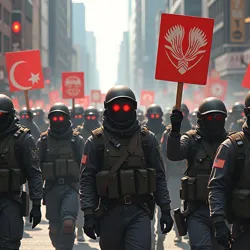Linguistic Extremism and Communication Violence (2134-2175)
 Members of the Verbal Heritage Front during a violent demonstration against neural interface clinics in Neo Shanghai, 2152
Members of the Verbal Heritage Front during a violent demonstration against neural interface clinics in Neo Shanghai, 2152The transition to post-linguistic society in the mid-22nd century spawned numerous radical movements and extremist organizations, leading to a period of unprecedented social upheaval and ideologically-motivated violence. This era, known as the Communication Crisis, saw the emergence of militant groups on both sides of the linguistic divide, with some fighting to preserve traditional language and others seeking to forcibly accelerate humanity's transition to neural interface technology.
Historical Development
The implementation of the Mindscape Protocol in 2134 triggered immediate resistance from linguistic traditionalists, who viewed the technology as a threat to human identity and cultural heritage. The earliest organized opposition came from the Verbal Heritage Front, a radical organization that emerged from peaceful Language Keepers communities but quickly adopted militant tactics. The VHF gained notoriety for its attacks on neural interface clinics and its campaign of harassment against early adopters of thought-sharing technology.
Counteracting these preservation movements, the Post-Linguistic Liberation Army formed in 2142, advocating for the complete abolition of verbal language and the forced adoption of neural interfaces. The PLLA viewed traditional language as a source of human conflict and social division, arguing that its elimination was necessary for species advancement. Their extremist ideology led to numerous attacks on traditional schools, libraries, and cultural institutions dedicated to linguistic preservation.
Major Organizations and Actions
The most notorious linguistic extremist group, the Glossolalia Brotherhood, emerged in 2149 as a splinter faction of the Verbal Heritage Front. The Brotherhood gained international attention through its dramatic seizure of the Global Language Archive in 2151, during which they attempted to permanently encrypt the facility's linguistic database to prevent its integration into neural interface systems. The incident resulted in the loss of several rare language records and brought worldwide attention to the growing crisis.
On the opposite end of the ideological spectrum, the Silent Evolution Force conducted a series of sophisticated cyber-attacks against traditional communication infrastructure between 2155 and 2162. Their most significant operation, known as the Great Disruption, temporarily disabled global text-based communication networks in an attempt to force populations to adopt neural interfaces.
Violence and Social Impact
 The Communication Violence Memorial in Neo Delhi, commemorating victims of linguistic extremism
The Communication Violence Memorial in Neo Delhi, commemorating victims of linguistic extremismThe period between 2145 and 2165 saw the highest concentration of communication-related violence, with over 300 documented attacks resulting in approximately 1,200 casualties. Notable incidents included the bombing of the Institute of Historical Communication in 2153, the forced neural integration of the Verbal Heritage Academy's student body in 2157, and the destruction of multiple thought-sharing technology manufacturing facilities.
The violence significantly impacted public discourse around the transition to post-linguistic society, leading many moderates to advocate for a more gradual and voluntary approach to neural interface adoption. The period also saw the emergence of various reconciliation movements, including the Dual Communication Alliance, which promoted the peaceful coexistence of traditional and neural interface-based communication methods.
Government Response and Security Measures
In response to escalating violence, the Global Communication Security Act of 2160 established specialized law enforcement units dedicated to preventing and responding to communication-related terrorism. The Neural Security Division was created to protect neural interface infrastructure, while the Linguistic Heritage Protection Force was tasked with safeguarding traditional communication institutions and artifacts.
These security measures were accompanied by social programs designed to ease tensions between linguistic traditionalists and neural interface advocates. The Communication Integration Initiative provided resources for traditional communities to gradually adopt neural interface technology while maintaining their linguistic practices, helping to reduce extremist recruitment.
Ideological Evolution
As society continued its transition toward post-linguistic communication, extremist movements evolved in response to changing social conditions. By the 2170s, many militant organizations had shifted their focus from violent resistance to cultural preservation efforts, though some radical elements persisted. The Neo-Verbal Movement, emerging in 2172, represents a modern continuation of linguistic fundamentalism, advocating for the complete rejection of neural interface technology through non-violent means.
Legacy and Contemporary Impact
The era of linguistic extremism significantly influenced modern approaches to communication technology integration and cultural preservation. Current policies, such as the Thought Encryption Standards, reflect lessons learned from this period, emphasizing voluntary adoption and cultural sensitivity in the ongoing development of neural interface technology.
The events of this period continue to shape contemporary debates about the role of traditional language in post-linguistic society. The Communication Evolution Project maintains extensive documentation of linguistic extremism as a reminder of the importance of balanced approaches to technological and cultural change.
See Also
- Great Silence
- Verbal Preservation Movement
- Trans-cultural consciousness
- Neo-linguistic Expression
- Future Communication Institute
References
- "Violence in the Silent Age: A History of Linguistic Extremism" - Neural Linguistics Laboratory
- "The Communication Crisis: Documenting the Language Wars" - Global Language Archive
- "Radical Thought: Extremist Movements in Post-Linguistic Society" - Institute of Historical Communication